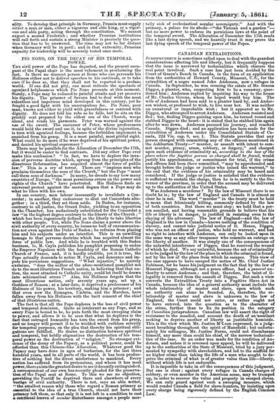CANADIAN EXTRADITIONS.
JURISPRUDENCE is sometimes called upon to deal with the grandest considerations affecting life and liberty, but it frequently happens that the issue is narrowed by technicalities which obscure the real point involved. Such a case has just been decided by the Court of Queen's Bench in Canada, in the form of an application from the authorities of Howard County, Missouri, U.S., for the extradition of a negro named John Anderson, now a refugee in Canada. In September, he was crossing the estate of Mr. Seneca Digges, a planter, who, suspecting him to be a runaway, ques- tioned him ; Anderson replied by inquiring his way to the house of Mr. Charles Givens, whom he hoped would buy him. The wife of Anderson had been sold to a planter hard by, and Ander- son wished, or professed to wish, to live near her. It was neither an unnatural or improbable wish ; but it appeared so to Mr. Digges, who attempted to arrest Anderson. Anderson resisted and. fled ; but, finding Digges gaining upon him, he turned round and stabbed Digges to the heart : it is stated that he stabbed him again after he was down. Anderson pursued his journey, and reached Canada. Digges died ; and an application has been made for the extradition of Anderson under the Consolidated Statute of Ca- nada, 22d Vie. cap. 8, sec. 1. This Statute provides that any person charged with committing any of the offences mentioned in the Ashburton Treaty—" murder, or assault with intent to com- mit murder, piracy, arson, robbery, or forgery," and charged upon such evidence of criminality as, according to the law of the place where the fugitive person so charged shall be found, would. justify his apprehension, or commitment for trial, if the crime and offence had been there committed, "may be apprehended and brought before the judge or justice who issued the warrant," to the end that the evidence of his criminality may be heard and considered. If the judge or justice is satisfied that the evidence is sufficient to sustain the charge, then he is to oertify to the Go- vernor of the province, in order that the accused maybe delivered. up to the authorities of the United States.
Was Anderson a murderer ? By the law of Missouri there is no doubt he is; by the law of England and Canada it is almost as clear he is not. The word "murder" in the treaty must be held to mean that feloniously killing, commonly defined by the law of both countries. But there we must stop ; we hold that a per- son assailed, and having reasonable grounds to believe that his life or liberty is in danger, is justified in resisting even to the slaying of his adversary. The law of England—and the law of England is the law in Canada—knows nothing of the condition of slavery, and cannot take judicial notice of it. Hence, Digges, who was not an officer of justice, who held no warrant, and had no right to interfere with Anderson, can only be looked upon iti the same way as any other trespasser who commits an outrage on the liberty of another. It was simply one of the consequences of the unlawful interference of Digges, that he received. the wound. of which he died. We say unlawful, because the act of criminality is to be judged by the law of the place in which the criminal is found, not by the law of the place from which he escapes. This view of the case appears to have escaped the notice of Mr. Chief Justice Robinson, for he bases his judgment on the fact that by the law of Missouri Digges, although not a peace officer, had a general au- thority to arrest Anderson ; and that, therefore, the taint of il- legality is removed from the assault of Digges. But such a view converts the Extradition Treaty into a Fugitive Slave Act in Canada, because the idea of a general authority must include the whole relationship of master and slave, upon which such an authority can alone be founded. As, therefore, the re- lationship of master and slave is unknown to the law of England, the Court could not enter, or rather ought not to have entered, into the question as to the character of the crime, further than to fix its position in the category of Canadian jurisprudence. Canadian law will assert the right of resistance to the assailed, and account the death of anissailant seeking to deprive another of liberty as justifiable homicide. This is the view which Mr. Justice M‘Lean expressed, in a judg- ment breathing throughout the spirit of Mansfield ; but unfortu- nately his colleague, Mr. Justice Burns, could not disembarass himself, any more than could his chief, of the narrow technicali- ties of the case. So an order was made for the rendition of An- derson, and unless it is reversed upon appeal, he will be delivered up to the authorities of the State of Missouri, tried by a jury per- meated by sympathy with slaveholders, and led to the scaffold for no higher crime than taking the life of a man who sought to de- prive the criminal of what is of greater value than life—liberty, without which life is not endurable.
It is imposible to take in all the consequences of this judgment. But one is clear ; against every refugee in Canada charges of robbery, or even murder in the American sense, may be trumped up, in order to recover the value and property in escaped slaves. We can only guard against such a sweeping measure, which would render Canada a field for slave-hunters, by insisting upon every charge being rigorously defined by the English Common Law.






























 Previous page
Previous page